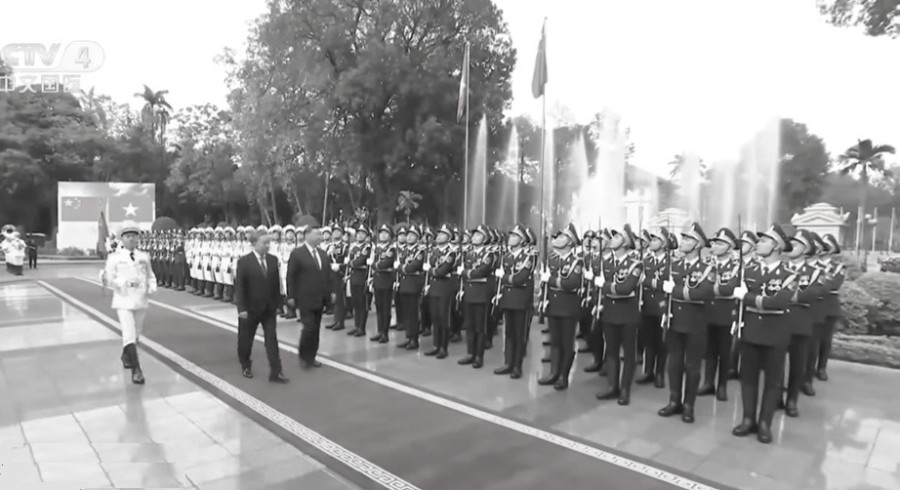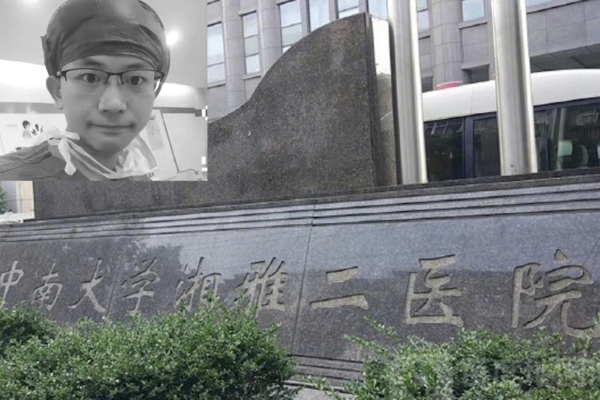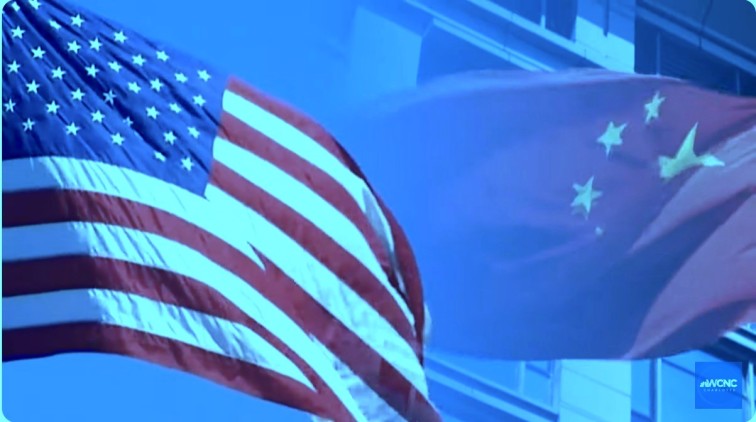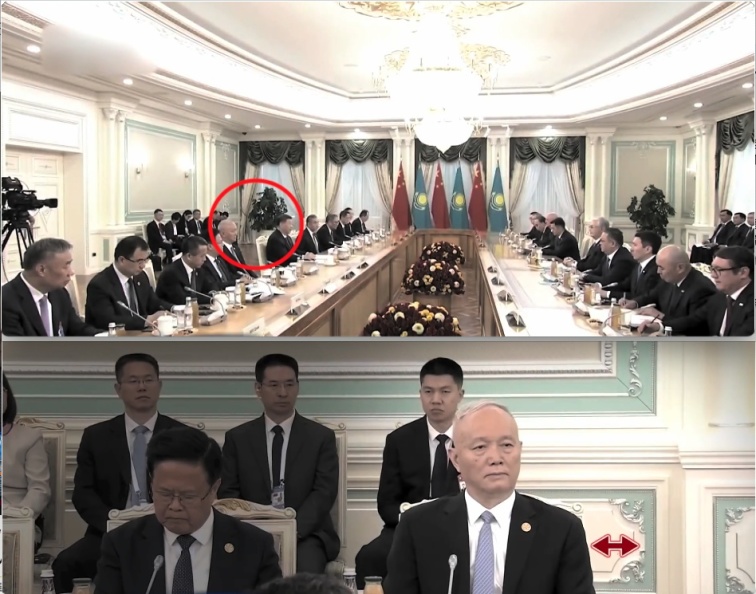On April 14, 2025, CCP leader Xi Jinping paid a state visit to Vietnam. In a video still, he can be seen walking with stiff legs and short, shuffling steps while inspecting the Vietnamese honour guard at the airport. (video screenshot)
[People News] The Chinese Communist Party (CCP) leader Xi Jinping has just concluded his visit to Kazakhstan to attend the second China–Central Asia Summit. From the remarks made by the presidents of the Central Asian countries during the summit—especially their "high praise" of Xi—it seems one can sense that they are likely aware of political changes taking place in Beijing.
First, during his meeting with Xi, Kazakh President Kassym-Jomart Tokayev, according to Kazakh media reports, began by stating:
“President Xi Jinping is always a highly respected guest whenever he visits Kazakhstan. This visit demonstrates the sincere and steadfast friendship between our two countries.” Such phrasing is unprecedented. Based on the author’s previous analysis, this may be a subtle hint that even if Xi loses power, Kazakhstan would still treat him with the honours of a distinguished guest.
Tokayev continued to express deep appreciation for Xi when discussing bilateral relations, elevating him to the status of a “distinguished statesman and a visionary leader held in high esteem by the international community.” In contrast, during the first China–Central Asia Summit held in Xi’an in 2023, Tokayev was much more reserved. While he did express some recognition of Xi, he offered no such “high praise.” This feels like a kind of flattery offered at a farewell.
Most noteworthy is that Tokayev specifically mentioned that Xi’s visit coincided with his birthday and said, “I wish him good health, family happiness, and even greater success in governing the country.” By contrast, in 2023, Tokayev merely congratulated Xi for “leading China to great achievements.”
Clearly, such personal remarks are not typical. Epoch Times political commentator Zhou Xiaohui, in his analysis, suggested that this publicly signals: Xi’s health is indeed in question, and Kazakhstan has become aware of the secrets the CCP has tried to conceal about both Xi’s physical condition and his possible loss of power.
Tokayev wasn’t the only one delivering such “farewell praise” and blessings to Xi. Uzbek President Shavkat Mirziyoyev’s public speech at the summit was also noteworthy.
According to the official media in Uzbekistan, Mirziyoyev expressed gratitude to Xi multiple times in his speech, beginning with: “I sincerely thank President Xi for his unwavering commitment to strengthening friendship and cooperation with countries in this region.” He added, “I completely agree” with what Xi said and continued, “I also sincerely extend my congratulations and best wishes on your recent birthday. You are a world-class statesman and one of the great political figures of our time.”
However, Chinese state media only retained the phrase “distinguished world statesman.” As for what Mirziyoyev meant by his “blessings,” readers can interpret that for themselves.
In 2023, Mirziyoyev’s language was much more restrained, merely stating that Xi’s “grand development strategy has earned the support of the entire Chinese people” and expressing belief that “under Xi’s leadership…” things would proceed well.
Yet when discussing China–Central Asia cooperation, Mirziyoyev referred to “Chinese leaders being firmly committed to developing friendly relations with neighbouring countries.” The phrase “Chinese leaders” may not necessarily refer specifically to Xi. It seems Mirziyoyev hopes that whoever comes next in Beijing will continue honoring past commitments and provide more investment to Central Asia.
Then there was Kyrgyz President Sadyr Japarov’s meeting with Xi. The Kyrgyz national news agency’s report on his summit participation briefly mentioned the bilateral meeting, saying the two leaders “extensively exchanged views on the current state and future of China–Kyrgyz relations and on deepening comprehensive strategic cooperation.”
Oddly, the report did not highlight Xi in any way, nor did it include any “high praise.” Moreover, the article only used official Chinese photos of the meeting, labelled “Xinhua Images.”
Yet in Chinese state media, Japarov is quoted as saying, “under the outstanding leadership of President Xi Jinping,” which was a step up from his 2023 phrasing, “under the strong and effective leadership of President Xi.” So why did Kyrgyz official media deliberately omit this? Could this be interpreted as a kind of “eulogy” language?
Similarly, Tajikistan’s state news agency, in its report on the meeting between Xi and President Emomali Rahmon, made no exaggerated remarks about Xi. Rahmon emphasised that “Your historic state visit to Tajikistan has opened new prospects for our comprehensive strategic partnership,” and added, “Tajikistan attaches great importance to its comprehensive strategic partnership with China.” The report gave a detailed account of existing and future cooperation, including agreements such as: “Agreement on Cooperation in the Field of Intellectual Property,” “Economic and Trade Cooperation Plan through 2030,” “Memorandum of Understanding on Establishing a Foreign Ministers’ Strategic Dialogue Mechanism,” “Memorandum of Understanding on Strengthening Cooperation in the Field of Artificial Intelligence.”
Chinese state media, however, quoted Rahmon as saying: “Under the strong leadership of President Xi Jinping, China has achieved significant economic and social development…,” and that Xi’s “historic state visit to Tajikistan last year opened a new chapter in bilateral relations.” In 2023, Rahmon hadn’t even made such statements.
As for Xi’s meeting with Turkmen President Serdar Berdimuhamedow, due to language barriers, the author could not find relevant reports from Turkmenistan’s official media. However, Chinese state media quoted Berdimuhamedow as saying:
“I am very pleased to meet with President Xi Jinping. I believe the summit will not only promote cooperation between Central Asian countries and China, but also enhance bilateral cooperation between Turkmenistan and China.” This kind of phrasing is similar to what was said at the 2023 summit, but with the addition of “very pleased to meet.”
Judging from the attitudes and blessings of the five Central Asian presidents toward Xi—particularly the unusual “high praise” given in public speeches—it really feels like they are placing laurels upon him at the moment of farewell. Does this indicate that the Central Asian presidents are already aware of the political changes taking place in Beijing and Xi’s impending removal from power? And does the fact that some of their state media downplayed or omitted details of these meetings further support this?
So far, it appears that many countries—including the U.S., Europe, Russia, the five Central Asian nations, Vietnam, Cambodia, Malaysia, and Singapore—may have already learned through various channels about Xi’s fate of being ousted. In this light, the world seems to be waiting for the political transformation in Beijing. △
(First published by People News)










News magazine bootstrap themes!
I like this themes, fast loading and look profesional
Thank you Carlos!
You're welcome!
Please support me with give positive rating!
Yes Sure!